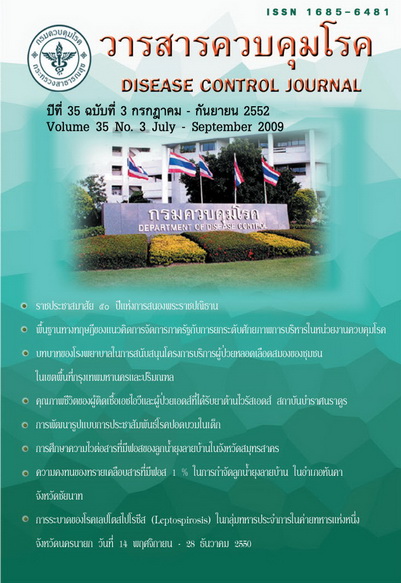Public Management Concepts: Implication for Capacity Building for Disease Control Organizations
Keywords:
Public management concepts, Disease control organizationAbstract
Disease control management is a system of coordinated health care interventions and communications for people, which needs technical skill, social skill and management capacity. In disease control organizations, professionals play a major role in organizing and providing disease control programs. However, the organizations are also controlled by the government. This form of the organizations has to follow many bureaucratic rules and strong professional control over the management process. The effectiveness of disease control management depends on management capacity to integrate all resources together. Public management is the subject of a rapidly growing science that is international in scope and multifarious in contents. This article presents the finding of literature review on philosophical investigation, theoretical origin and implication of public management concepts for disease control organizations. The philosophical investigation identify competing philosophical paradigm that underpin contending perspective on what constitutes good public management. It then reviews the evolving literature on the development of administration taught which have theoretical influence from public choice theory and management theory. The earliest conception of public management was as a structure of governance, that is, a formal means for constraining and overseeing the exercise of state authority by public managers, in recent decades, increasing emphasis has been placed on public management as a craft practiced by specific individuals in specific managerial roles. New Public Management (NPM) represent infusion of private style management idea and technique into public services. There are different subtypes reflecting distinct managerial school of taught; 'hard NPM' and 'soft NPM'. The public management concepts move locus of control and absorb professionals into a new management function, 'Soft NPM', associated with human relation school of private sector management rather than account logic, which some implication to disease control organization.
Downloads
References
2. Bowornwathana B. Putting new public management in good use: autonomous public organization in Thailand. In: Pollitt C, Talbot C, eds. Unbundled government: a critical analysis of the global trend to agencies, quangos and contractualisation. Oxon, UK: Routledg, 2005. p.247-63.
3. Merton RK. Bureaucratic structure and personality. In: Shafritz JM, Ott JS, eds. Classics of organization theory, 5th ed. New York: Harcourt College, 1957. p.103-11.
4. Peters BG. Future of governing, 2nd ed. Lawrence, KS: University Press of Kansas, 1996.
5. Barzelay M. Breaking through bureaucracy: a new vision for managing in government. Berkeley, CA: University of California Press, 1992.
6. Hood C. A public management for all seasons? Public Administration 1991; 69: 3-19.
7. Osborne D, Gaebler T. Reinventing government: how the entrepreneurial spirit is transforming the public sector. Reading, MA: Addison-Wesley, 1992.
8. Beckett J. The government should run like a business mantra. The American Review of Public Administration, 2000; 30: 185-204.
9. Dixon J, Dogan R. The contending perspectives on public management: a philosophical investigation. International Public Management Journal. 2005; 8: 1-21.
10.Pollitt C, Bouckaert G, editors. Public management reform: a comparative analysis, 2nd ed. Oxford: Oxford University Press, 2004.
11.Walsh K. Public services and market mechanisms: competition, contrasting and the new public management. London: Macmillan, 1995.
12.Gruening G. Origin and theoretical basis of the new public management. International Public Management Journal 2001; 4: 1-25.
13.Hood C, Peters BG. The middle aging of new public management: into the age of paradox? Journal of Public Administration Research and Theory, 2004; 14: 267-82.
14.Rainey H.G. Public management: recent research on the political context and managerial roles, structures, and behaviors. Journal of Management, 1989; 15: 229-50.
15.Pierre J, Rothstein B. How should state behave? The new public management versus the new weberianism. Working paper presented at the conference on "New Public Management and the Quality of Government" at the University of
Gothenburg, 13-14 November 2008.
16.Golembiewski RT. Humanizing public organization. Mt.Airy, MD: Lomond, 1985.
17.Wagenaar H. Knowing the rules: administrative work as practice. Public Administration Review, 2004; 64: 643-54.
18.Ferlie E, Geraghty KJ. Professionals in public sector organization: implication for public sector reforming. In: Ferlie E, Lynn LE, Pollitt C, editors. The Oxford handbook of public management. Oxford: Oxford University Press, 2007. p.422-5.
19.Freidman M. Capitalism and freedom. Chicago: University of Chicago Press, 1962.
20.Berger PL, Luckmann T. The social construction of reality: a treatise in the sociology of knowledge. New York: Garden City, Anchor Books, 1967.
Downloads
Published
How to Cite
Issue
Section
License
Articles published in the Disease Control Journal are considered as academic work, research or analysis of the personal opinion of the authors, not the opinion of the Thailand Department of Disease Control or editorial team. The authors must be responsible for their articles.






